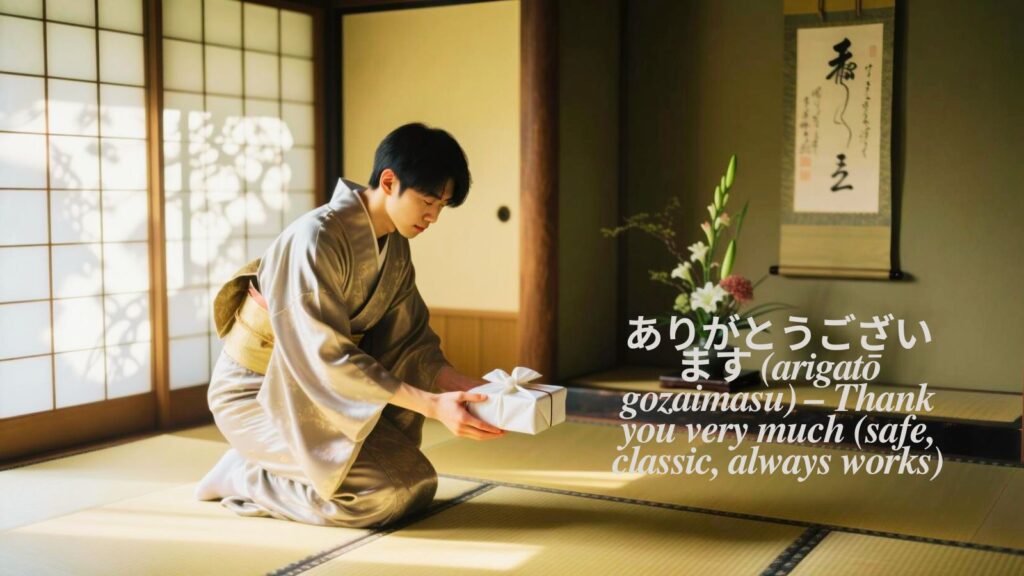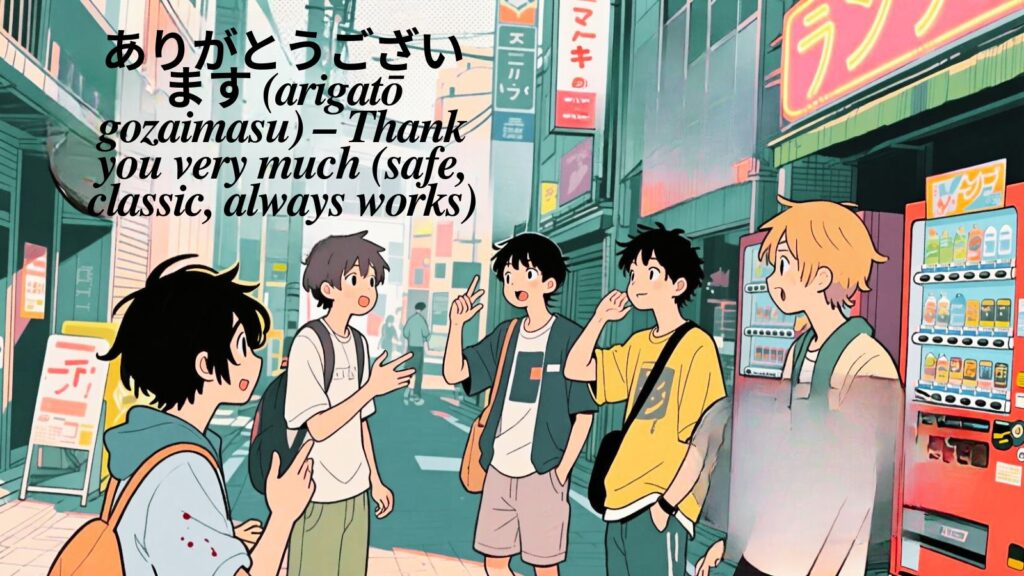Thank you in Japanese isn’t just a phrase it’s a little gift you hand to someone, wrapped in respect, warmth, and the beauty of Japanese culture. You’re not just saying words, you’re sharing a piece of connection that can melt formal walls or make a casual moment unforgettable.
If you’ve ever wondered how to express your gratitude in a way that feels genuine, charming, and culturally spot-on, you’re in for a treat. By the time you finish reading this, you’ll have more than just phrases you’ll have the confidence to use them like you were born in Tokyo.
Formal gratitude in Japanese that’ll make your elders proud

When the situation smells of formality levels be it business settings, meeting elders, or writing to the business community you can’t just toss out casual slang. You go respectful, polished, almost as if each syllable is wearing a tie.
- ありがとうございます (arigatō gozaimasu) – Thank you very much (safe, classic, always works)
- どうもありがとうございます (dōmo arigatō gozaimasu) – Thank you very much indeed
- 感謝いたします (kansha itashimasu) – I am grateful (very polite, very proper)
- 御礼申し上げます (gorei mōshiagemasu) – I offer my thanks (rare outside letters or speeches)
- 感謝してる (kansha shiteiru) – I’m grateful (slightly softer than the above)
- お褒めいただきありがとうございます (o-home-itadaki arigatō gozaimasu) – Thank you for your kind words (compliments feel heavier here)
- 誉めてくれてありがとう (homarete kurete arigatō) – Thank you for praising me (warmer, less stiff)
- 助かったよ (tasukatta yo) – You saved me (formal but also warm)
- 本当にありがとう (hontō ni arigatō) – Thank you so much (formal but heart-forward)
Little punch line: In Japanese polite speech (keigo), your tone is half the message. The words are the other half, but without the tone, you’re just sending a text without an emoji.
Informal gratitude for friends, peers, and those late-night ramen saviours
Sometimes you’re talking to friends, peers, or people you met five minutes ago over takoyaki, and a stiff kansha itashimasu would feel like wearing a tux to a beach party.
- めっちゃありがとう (meccha arigatō) – Thanks a lot (Osaka loves this one)
- すごくありがとう (sugoku arigatō) – Thanks a lot (Tokyo-friendly casual)
- めちゃくちゃありがとう (mechakucha arigatō) – Thanks a ton (dramatic, fun)
- 超ありがとう (chō arigatō) – Thanks a lot (slangy cool)
- ありがとうね (arigatō ne) – Thanks, you know (softened with “ne”)
- どうも (dōmo) – Thanks (super short, informal)
- ありがと〜 (arigatō~) – Thanks (cute drawn-out ending)
- 助かった (tasukatta) – You saved me (more relaxed tone)
- ほんとありがとう (honto arigatō) – Really, thanks (as if you’re shaking your head while smiling)
Punch line: Casual thank you in Japanese isn’t about grammar perfection it’s about sounding like you’re in the same social room as the other person.
Thank you for the meal in Japanese
Food in Japan is not just food. It’s ceremony, it’s gratitude to the cook, to the farmer, maybe even to the rice itself if you’re poetic enough. In dining situations, you can’t skip these.
- ごちそうさまでした (gochisōsama deshita) – Thank you for the meal (after eating)
- ごちそうさま (gochisōsama) – Thanks for the meal (less formal)
- 大変美味しかったです (taihen oishikatta desu) – It was very delicious
- 美味しかった (oishikatta) – Delicious (casual)
- ご飯ありがとう (gohan arigatō) – Thanks for the food (home setting)
- 作ってくれてありがとう (tsukutte kurete arigatō) – Thanks for cooking
- おいしいご飯ありがとう (oishii gohan arigatō) – Thank you for the tasty meal
- ご馳走感謝 (gochisō kansha) – Thanks for the feast (poetic touch)
Punch line: In Japanese meal appreciation phrases, you’re thanking the hands and the heart that made it.
Compliment responses in Japanese culture
Someone says “You’re amazing” now you’re stuck between humility and happiness. In compliment responses, Japan leans heavily toward modesty.
- お褒めいただきありがとうございます (o-home-itadaki arigatō gozaimasu) – Thank you for your kind words
- 誉めてくれてありがとう (homarete kurete arigatō) – Thanks for praising me
- そんなことないです (sonna koto nai desu) – It’s not like that (modest rejection)
- まだまだです (mada mada desu) – Not yet (I still have far to go)
- 恐縮です (kyōshuku desu) – I’m humbled
- 嬉しいです (ureshii desu) – I’m happy (direct)
- ありがとうございます、励みになります (arigatō gozaimasu, hagemi ni narimasu) – Thank you, it encourages me
Punch line: Compliment in Japanese = juggling respect, modesty, and secretly grinning inside.
Business Japanese thank you phrases
In business settings, formal context is not optional it’s the ground you walk on. Gratitude here often feels like shaking hands while standing on a tatami mat.
- ありがとうございます (arigatō gozaimasu) – Thank you very much
- どうもありがとうございます (dōmo arigatō gozaimasu) – Thank you very much indeed
- 感謝いたします (kansha itashimasu) – I am grateful
- 御礼申し上げます (gorei mōshiagemasu) – I offer my thanks
- 感謝しております (kansha shite orimasu) – I’m sincerely grateful (business safe)
- いつもありがとうございます (itsumo arigatō gozaimasu) – Thank you as always (for ongoing business)
- ご協力ありがとうございます (go-kyōryoku arigatō gozaimasu) – Thank you for your cooperation
- 引き続きよろしくお願いいたします (hikitsuzuki yoroshiku onegai itashimasu) – Thank you and I look forward to continued cooperation
Punch line: In cultural etiquette in Japan, a business thank-you is almost like writing a polite poem in suit-and-tie form.
Casual Japanese slang for thanks

Sometimes, especially with peers or during day-to-day conversations, you throw politeness out the shoji window.
- サンキュー (sankyū) – Thank you (borrowed from English)
- あざっす (azassu) – Thanks (youth slang from “arigatō gozaimasu”)
- どもっす (domossu) – Thanks (shorter slangy form)
- ありがとっす (arigatossu) – Thanks (friendly slang)
- サンキュな (sankyū na) – Thanks (with casual “na”)
- 感謝! (kansha!) – Gratitude! (punchy)
Punch line: Slang thanks in Japanese feels like wearing sneakers to a tea ceremony you can do it, but know where you are.
Everyday Japanese gratitude expressions
Everyday Japanese gratitude expressions slip into moments like someone holding the elevator or passing you the soy sauce.
- どうも (dōmo) – Thanks
- ありがと (arigato) – Thanks (no long vowels)
- ありがとう〜 (arigatō~) – Thanks (stretched)
- すみません (sumimasen) – Sorry/thank you (context decides)
- どうもすみません (dōmo sumimasen) – Thank you and sorry (double polite)
- ごめんありがとう (gomen arigatō) – Sorry, thanks
- ほんと感謝 (honto kansha) – Really grateful
Punch line: Japan sometimes thanks and apologizes in the same breath it’s a politeness super-combo.
Thank you so much in Japanese
When your heart is doing fireworks and you need thank you so much in Japanese that goes beyond just polite.
- 本当にありがとう (hontō ni arigatō) – Thank you so much
- 本当にありがとうございます (hontō ni arigatō gozaimasu) – Thank you so much (formal)
- 心から感謝します (kokoro kara kansha shimasu) – I thank you from my heart
- 大感謝です (daikansha desu) – Huge thanks
- 本当に助かりました (hontō ni tasukarimashita) – You truly saved me
Punch line: Japanese expressions for gratitude at this level almost feel like writing love letters to kindness itself.
Japanese appreciation vocabulary for emotional impact
Not all gratitude is cookie-cutter. Sometimes it’s tinted with relief, flattery, or just deep sighs of happiness.
- おかげさまで (okagesama de) – Thanks to you (implies help)
- 助かりました (tasukarimashita) – That helped a lot
- ご親切にありがとうございます (go-shinsetsu ni arigatō gozaimasu) – Thank you for your kindness
- ありがたいです (arigatai desu) – I’m grateful
- 感無量です (kanmuryō desu) – I’m filled with emotion
- 恐縮です (kyōshuku desu) – I’m humbled
Punch line: In social etiquette in Japan, a word can carry both respect and a little tear in the corner of your eye.
How to respond in personal relationships

In personal relationships with family, friends, or even strangers who turn into friends after one train ride you can soften edges and warm up your language.
- ありがとう、大好きだよ (arigatō, daisuki da yo) – Thank you, I love you
- ありがとう、助かったよ (arigatō, tasukatta yo) – Thanks, you saved me
- ほんとありがとね (honto arigato ne) – Really, thanks
- ありがとう、またね (arigatō, mata ne) – Thanks, see you again
- ありがと〜!助かる! (arigatō~! tasukaru!) – Thanks! That helps!
Punch line: The warmth here is like miso soup gentle, comforting, and personal.
Conclusion: Thank you in Japanese
In the Japanese language, saying thank you is never just two words it’s an art form dipped in politeness, wrapped in cultural norms, and sprinkled with just enough humility to keep it from feeling over-the-top. From business Japanese thank you phrases to casual Japanese slang for thanks, from dining etiquette to compliment responses, you’ve now got over a hundred little linguistic gifts to give away.
Now it’s your turn which one of these made you smile the most? Or better yet, tag someone who needs to learn that めちゃくちゃありがとう exists.
If you want, I can also create a compact visual table summarizing all 100+ phrases with their context so it’s easy to remember. That would make this guide even more practical. Do you want me to do that next?









